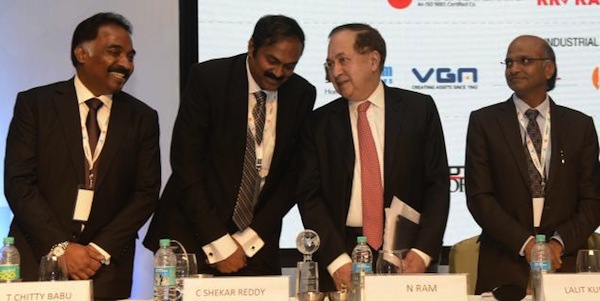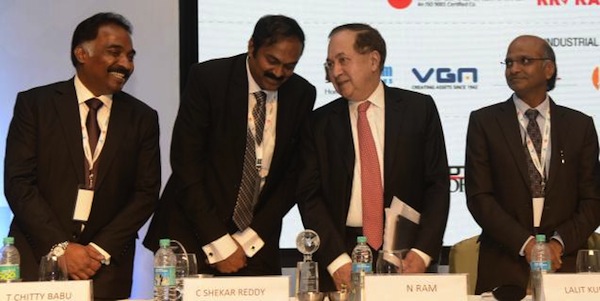CREDAI’s Work Commended
The real estate sector is an important component of national economic activity, but it is often under-estimated, and sometimes demonised due to misconceptions, said N. Ram, chairman, Kasturi and Sons Limited.
 N. Ram, chairman, Kasturi and Sons Limited, (third from left) was speaking at the inauguration of CREDAI Southcon 2013. Also seen (from left): T. Chitty Babu, C. Shekar Reddy, and Lalit Kumar Jain of CREDAI. Photo: R. Ragu (The Hindu)
N. Ram, chairman, Kasturi and Sons Limited, (third from left) was speaking at the inauguration of CREDAI Southcon 2013. Also seen (from left): T. Chitty Babu, C. Shekar Reddy, and Lalit Kumar Jain of CREDAI. Photo: R. Ragu (The Hindu)Speaking at the inauguration of ‘CREDAI Southcon 2013’, Mr. Ram said the media tends to rush to judge the sector, because of the misperception that it fattens itself on hyper profits or super profits. Real estate is a high-risk sector where decisions are based on intuition in the absence of scientific data. Print and electronic media fall victims to this perception, he said.
Mr. Ram cited instances of confrontations between media houses and the Confederation of Real Estate Developers’ Association of India (CREDAI), where the real estate sector that has an advertisement budget of Rs. 5,000 crore a year complained that news coverage was unfair. While it may seem ‘fair enough’ he added that sometimes the industry too should not be over-sensitive to news, especially in times of economic slow-down as long as the media got the facts right.
He commended CREDAI for organising the sector and setting forth a voluntary code of conduct. If this was binding, enforced in a fair and transparent way and addressed customers needs, a ‘tremendous job would have been done,’ he said.
‘Government cannot blame developers’
It was shocking to hear that nearly 40 per cent of the sales cost of housing is due to approval costs, he said. The shortfall in social housing needs to be addressed by the Central and State governments through subsidies. While builders too need to contribute, governments cannot broadly blame the real estate developers for public sector failure, Mr. Ram added.
Right from registration of a property to completion of a project, there was large-scale corruption, said T. Chitti Babu, chairman of the CREDAI Southcon 2013. This, in turn, delayed the project resulting in escalation of costs. Existing practices and prevailing old systems were being forced on the real estate sector. It would take several years to get an approval for a housing project and the situation was prevalent all over the country, he said.
“Most of the developers concentrate on developing houses or office buildings for IT sector. But, there is good scope available in other sectors such as healthcare, entertainment and educational,” he added.
Simplification of the application process needed to be done immediately at the State-level, said C. Shekhar Reddy, national president of CREDAI. For this, the State presidents of CREDAI have to approach the respective state governments, he said.
Lalit Kumar Jain, chairman, CREDAI, said as far as the real estate sector was concerned, a few cities such as Bangalore and Pune were doing well. In India, the process of approval had become very slow, he said, pointing out that in Maharashtra alone, nearly Rs. 125 thousand crore worth of projects were waiting for clearance.
Via : thehindu.com
Connect With Us
Related Posts
- Real Estate Act comes into effect: 10 things you need to know about new law ( May 4, 2017 )
- Expats Living in Comfort – Hyderabad, India ( May 4, 2017 )
- MNC queue to Hyderabad grows longer; JP Morgan & IBM look for office space ( June 22, 2016 )
- An Apple in Hyderabad’s IT Garden: CEO Tim Cook’s big announcement Today ( May 19, 2016 )
- Hyderabad May get Disneyland Park ( April 22, 2016 )
- Indian Office Space Absorption Up 11% in Q4: Survey ( April 13, 2016 )
- Cognizant plans to add 8,000 people at Hyderabad facility ( March 9, 2016 )
- Ranked 139 in world, Hyderabad is Best Indian City to Live in ( February 24, 2016 )
- The Platina – Exclusive Commercial Space, Hyderabad ( February 19, 2016 )
- Apple, Inc set to open new $25 million Tech Center in Hyderabad, India by June ( February 16, 2016 )
Recent Posts
Recent Comments
Archives
- February 2018
- October 2017
- May 2017
- June 2016
- May 2016
- April 2016
- March 2016
- February 2016
- January 2016
- December 2015
- November 2015
- October 2015
- July 2015
- June 2015
- May 2015
- April 2015
- March 2015
- February 2015
- December 2014
- November 2014
- October 2014
- September 2014
- August 2014
- July 2014
- June 2014
- May 2014
- April 2014
- March 2014
- February 2014
- January 2014
- December 2013
- November 2013
- October 2013
- September 2013
- August 2013
- July 2013
- June 2013
- May 2013
- April 2013
- March 2013
- February 2013
- January 2013
- December 2012
- November 2012
- October 2012
- September 2012
- August 2012
- July 2012
- June 2012
- May 2012
- April 2012
- March 2012
- February 2012
- January 2012
- December 2011
- November 2011
- October 2011
- September 2011
- July 2011
- June 2011
- May 2011
- March 2011
- November 2010
- October 2010
- September 2010
- August 2010
- July 2010
- May 2010
- April 2010
- March 2010
- February 2010



Leave a reply